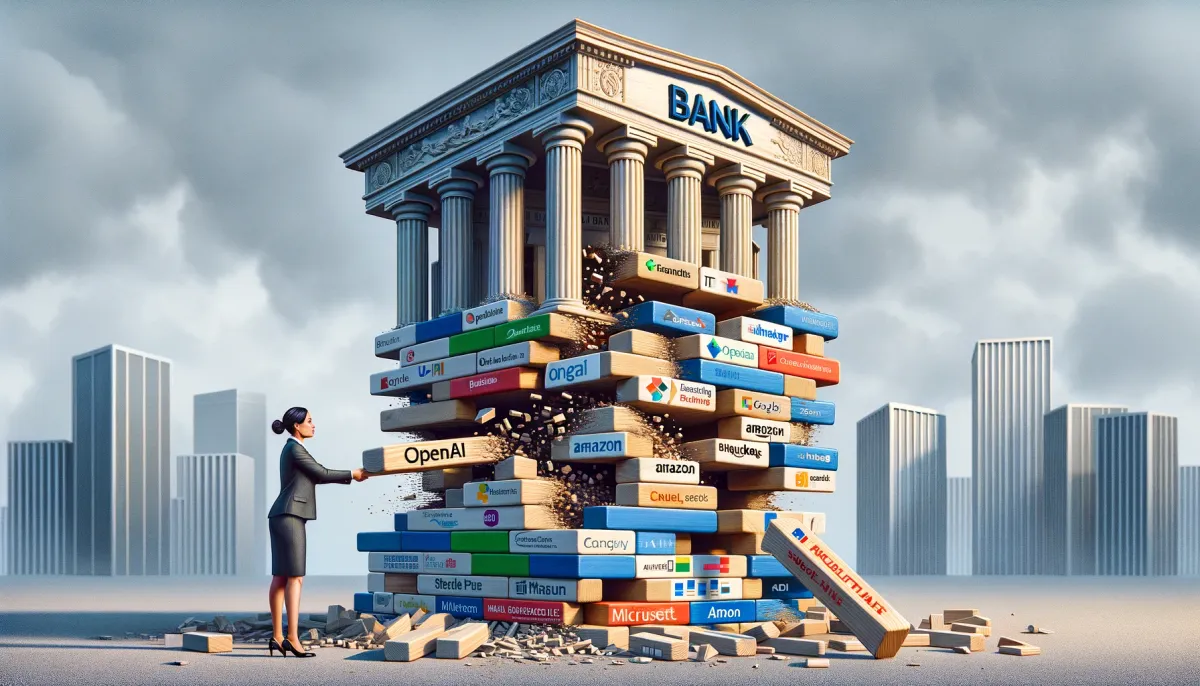AI Boom Heightens Banks' Addiction to Big Tech, Admit European Bankers
Top European bankers are sounding alarms about the increased addiction to unproven AI Tech. This dependence, reminiscent of Fujitsu's Horizon project failures, would lead to financial collapses, and increase economic uncertainty.

Like the stimulant nicotine, the burgeoning field of artificial intelligence is set to deepen banks' reliance on major U.S. tech firms, ushering in new risks for the industry, according to top European banking executives.
The fervor surrounding AI's potential in financial services—already extensively employed for detecting fraud and money-laundering—has reached fever pitch since the debut of OpenAI's ChatGPT in late 2022. Banks are now actively exploring the deployment of generative AI. Yet, at a recent assembly of fintech leaders in Amsterdam, some voiced their unease over the escalating dependence on a select few tech giants, necessary for the computational heft AI demands.
Bahadir Yilmaz, chief analytics officer at ING, a Dutch banking behemoth, told Reuters he foresees an increasing dependency on Big Tech for infrastructure and machinery. "The computational power required for these technologies is immense. It's impractical for a bank to develop this tech in-house," Yilmaz stated.

He highlighted that banks' reliance on a limited number of tech providers is "one of the biggest risks." Yilmaz stressed the importance for European banks to maintain the ability to switch between different tech providers to avoid "vendor lock-in."
In a bid to address these concerns, the UK proposed regulations last year to oversee financial institutions' heavy reliance on external tech firms like Microsoft, Google, IBM, and Amazon. Regulators fear that a failure at any single cloud computing firm could cascade into widespread service disruptions across numerous financial institutions.
Joanne Hannaford, head of technology strategy at Deutsche Bank’s corporate bank, underscored this point at the Money20/20 conference. "AI requires enormous computational resources, and realistically, Big Tech is the only source for this," she remarked. Hannaford noted that banks are mandated to inform regulators when data is migrated to the cloud, a process that will become increasingly intricate with the expanded use of cloud computing.

She also mentioned the necessity of communicating to regulators the risks associated with not harnessing cloud computing’s capabilities, emphasizing the potential opportunity costs.
AI dominated discussions at the recent Amsterdam conference. Arthur Mensch, CEO of the French AI startup Mistral AI, posited that there are "synergies" between its generative AI products and financial services, offering significant opportunities in data analysis and monitoring—tasks bankers find invaluable.

ING is currently piloting an AI chatbot that handles 2.5% of customer service interactions. Yilmaz anticipates that within a year, this chatbot could manage half or more of such conversations.
In a recent statement, the European Union's securities watchdog emphasized that banks and investment firms cannot abdicate their boardroom responsibilities and are legally obligated to protect customers when deploying AI. The watchdog warned that AI could substantially impact retail investor protection.
Fujitsu's Horizon Project and Banking's Dependence on Big Tech and AI

Let us delve into a rather instructive disaster: the systemic failures of Fujitsu's Horizon project. This ill-fated IT system, deployed by the UK's Post Office, was riddled with errors, leading to wrongful accusations of theft and false accounting against sub-postmasters.
The sheer scale of this debacle highlights the inherent dangers of reliance on opaque and unaccountable IT systems. Now, draw the parallel to our beloved banking sector, which is increasingly tethered to a handful of Big Tech firms for AI and cloud computing. The alarm bells should be deafening, yet here we are, marching towards potential systemic failures with eyes wide shut.
The risks for future banking crises are, to put it mildly, substantial if major IT vendors for financial services remain shrouded in opacity. Picture operational disruptions, data breaches, and systemic collapses all courtesy of vendor lock-in. The complexity and scope of AI and cloud computing mean that any technical failure or security breach could initiate a global disruption in financial services.
Moreover, the lack of transparency and accountability from these tech behemoths ensures that banks might remain blissfully unaware of the full spectrum of risks, thereby hampering effective risk management strategies.
| Year | Number of Outages | Major Outages (Links) |
|---|---|---|
| 2008 | 5 | Major Bank Outage Hits Customers |
| 2009 | 6 | Bank systems glitch leaves thousands unable to access funds |
| 2010 | 4 | Technical Issue Leads to Major Banking Outage |
| 2011 | 7 | Nationwide Bank Outage Due to IT Problems |
| 2012 | 8 | Massive Banking Outage Affects Millions |
| 2013 | 10 | Bank IT Meltdown Causes Chaos |
| 2014 | 9 | Major Bank Experiences IT Outage |
| 2015 | 11 | Bank Outage Leaves Customers Stranded |
| 2016 | 12 | Technical Fault Causes Bank Outage |
| 2017 | 14 | Major IT Outage Hits Banking Sector |
| 2018 | 15 | Banking System Failure Causes Widespread Disruption |
| 2019 | 18 | Bank IT Outage Causes Major Disruption |
| 2020 | 20 | Technical Issue Causes Bank Outage |
| 2021 | 22 | Major Bank Outage Affects Millions |
| 2022 | 25 | Banking Services Down Due to IT Issues |
| 2023 | 27 | IT Outage Causes Major Bank Disruption |

The fallout from such systemic failures would not be confined to the financial industry but would ripple out, causing societal upheaval. A significant IT failure in a major bank could lead to a catastrophic loss of customer trust, financial instability, and even precipitate economic crises. The dependency on a few tech giants creates a perilous single point of failure. Exploit this, and you have the recipe for widespread service outages and financial chaos.




